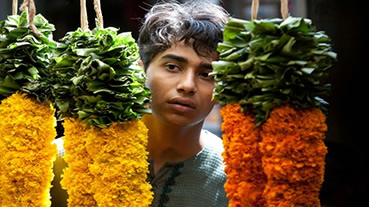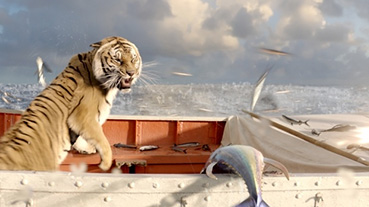"I've always wanted to do that ... since film school, and no one allowed
me to. Why do we have to stick with one ratio? I felt that 'Scope was
the only way to see this [flying fish] scene, and with the black areas
[at the bottom of the frame], I could pull fish out of there; I think
that's a great tool in 3D film-making. I think it's very exciting." |
Ang Lee on changing aspect ratios mid-movie...
Interview with the Director on Nashvillescene.com |
I'll tackle this curious aspect of the simply gorgeous Life Of Pi nearer the end of this relatively short appreciation of a movie rich in visual splendor and not short of a few philosophical conceits either. This extraordinary story started life as a novel turned down by many publishers. It went on to win the Mann Booker prize in 2002 and thrilled and enchanted its many readers. The adult Piscine Molitor Patel, an Indian settled in Canada, recounts his story set in 1977 to a visiting writer seeking inspiration. Teased all through school in Pondicherry as 'Pissing Patel', he claims the name 'Pi' to try and put an end to his moniker-inflicted misery. Intensely curious, Pi is turned on to all three of the religions that surround him despite being raised by his father, a man of reason. Pi wants to know God so he embraces Hinduism, Islam and Christianity. Sheesh. His family owns a zoo but not the land on which it sits and when the financial burden of life becomes too heavy, they all set sail on a Japanese cargo ship, animals and all, to Canada and one night there is an almighty storm...
Both book and movie make a point of suggesting that after the telling, you will be moved to discover God as the fantastic elements of the tale will seduce you into believing in supernatural agencies. Well, as a rational free thinker (at least, Mr. Jailer, I think I'm free), I take issue with this spurious claim. If the claim is made cynically as a marketing tool to promote the story, then fine. We are used to the overuse of superlatives to entice us to pay up for our entertainment. If not... First of all, the story is a story and not a retelling of a person's real experience (oh, were that so...). Secondly, despite the fantastic nature of the story, how does a wonderful account of survival on a lifeboat with a Bengal tiger point to the existence of God when to make this chain of events lead to Pi being stranded, the crew of a large ship including Pi's own family, have to perish in a storm? Well, I guess it depends on your interpretation of God. It seems I have a very narrow definition – a supernatural being who seems caught up in an ambivalent relationship with its creations and morbidly interested in what we do with our reproductive organs. Pi seemed alarmingly open to spiritual experiences given that the origin of that spiritual experience had wiped out his only human links to planet Earth and cast him adrift facing a slow, tortuous death by starving or thirst or a swift one of disembowelment by a tiger. As God 'moves in mysterious ways', this all seemed perfectly reasonable as there is a divine plan, you see. In the William Cowper poem, that most over-quoted line about God that's not in the Bible is only ever relevant as a punch line in an Alexei Sayle sketch. Otherwise, it means the omnipresent thug can do anything and it's all OK. Jesus. So many people think that line is Gospel. His wonders to perform. Spare me.

Seeing the movie of a beloved book is a little like comparing visual notes with the director. You've already made the movie with an unlimited budget in your imagination and now you're getting to see someone else's interpretation. There was a radio programme I heard last week about how faithful a film adaptation should be and I keep hearing Orson Welles' magisterial voice saying essentially that the original work is simply a point of departure and that your respect for the work should be thrown out of the window. You're making a movie, not just visually painting the incidents already described. This is why Joseph K in Welles' The Trial was guilty as hell (in the Kafka novel, the whole point is that he has no idea why he's charged and no clue what he's done and therefore tacitly innocent). If you've not read the source novel but have read enough about the film to intrigue you then see Life Of Pi with as many narrative surprises intact as you can. I will allude to some of the events but will try to keep this spoiler free.
It's no spoiler if it's in the trailer and so I have no issue with telling you that Pi ends up on a lifeboat with some curious and dangerous animals. You cannot get away with not mentioning the astonishing, eye popping work of the effects team. Lee used about thirty shots of a real tiger in the movie, pointed to them and said to the FX house, Rhythm and Hues, "You have to match that... in 3D!" That said, their work is more than astonishing, it's great art and it is pushing CG into new areas, the most important is the area in which we forget we are seeing a computer rendering and instead embrace Richard Parker as a real, live animal. Wow. Seriously though. Wow.
Lee is also on record saying that he didn't want to make the movie in 2D. Note to Lee, the movie works fine in 2D. I guess this is the voice of a director who's always pushing himself and the art he's hoping to make. So right in the middle of the movie comes the set piece of the novel – the flying fish sequence. I'd been looking forward to this and suddenly, bang. Grey lines snap on at the top and bottom of the 1.85:1 frame essentially making it into 2.35:1 cinemascope. The lines aren't black because they are printed on to the film and there are few film stocks that can give you true black (if any at all), the true black of the cinema's own velvet frames. So suddenly when you are most engaged in the drama, a small percentage of the picture is taken away and I found myself asking the dumbest question asked by people none too bright seeing the black matte lines on their TV sets, "Why can't I see all the picture?" I felt cheated and confused and while I should have been thrilled, I sat there with these three thoughts; I have now disengaged with the movie; the movie has forced me to think of technical issues when I should be being thrilled and finally; is there something wrong?

I have no idea what this looks like in 3D (I've had it with the glasses) because the bloody fish were on top of the grey lines (maybe that looked great in 3D) but all it looked like was a mistake and that is why his film school lecturers told him not to do it. I then felt pissed off that I had to re-engage and then bang, we're back in 1.85:1 and I sat there thinking "God, that was Ang Lee's decision to do that. What an ugly misstep in such a beautiful piece of work." So just as I was settling in to the movie, he does it again! This time he turns his 1.85:1 Academy ratio into the almost square 4:3 by snapping thicker grey lines on the right and left of screen. Insane! Lee says "It looks like the book's cover," and I say so fricking what? I'm surprised no one tapped him on the shoulder and said "Mr. Lee, this is plain silly." If you're going to try and get away with it, how about dissolving the matte lines in over a minute of screen time or so. Snap them on and it's like "Wha...?" Or at least warn us going in that the aspect ratio is going to change so we don't think something's wrong when it happens... Or, widen the sides so the screen gets bigger (I saw a film print projected and I think that would be technically impossible).
The performances in the movie are particularly well crafted. Lee has always been quite the actors' director. He does subtle so well. The adult Pi (played by Irrfan Kahn) has the ability to elicit tears by his force of commitment and an effortless integrity alone. We are offered a choice of events at the close but who wants to go with anything but the tiger story? Suraj Shama as Pi on the lifeboat does a fantastic job rooting us in the real while all around the animal cast and events are telling us this must be a magic fable of a kind. Shama (to use a phrase I despise but it's apt here) 'keeps it real' aided by some of the greatest FX artists in the business. After all the fuss about Gerard Depardieu moving to Belgium to save paying France's higher tax rate, it is nice to see him back on the screen as a cook serving slop and being utterly offensive to Pi's family. Vegetarianism wasn't big on Japanese cargo ships in the late 70s. Prometheus' unfortunate and witless xenobiologist, Rafe Spall, plays the enraptured writer (presumably playing the real writer Yann Martel) with enough awe and enthusiasm to gently convince. As Pi's adventures veer off into the bizarre, his wide-eyed look says volumes about wanting to believe but finding some doubt. It's fitting that Martel uses this device in the book (the visiting writer) as he acknowledges the idea of being stuck on a lifeboat with a wild animal came from another source. It's also strange to note that Tobey MaGuire was cast and shot these scenes but director Lee decided he was too famous and would unbalance the movie. Was Lee not aware of how big the original Spider-man trilogy was? That just seems odd. Our current Spider-man, Andrew Garfield, was also considered for this role.
Overall and aspect ratio carping aside, this is an assured piece of cinema with some magical images and enough philosophy and spiritual musing to satisfy the book's most religiously minded fans. The story highlights only religion's more beneficial side (apparently it has one) and shouldn't be seen as a balanced argument between reason and faith. It sits on faith as a sort of magic carpet and let's the hero interpret every experience through the somewhat narrow focus of a believer looking for God in all the nooks and crannies of this wondrous planet. Director Lee has penned a cinematic love letter to all that is colourful and luminescent in the world and makes us appreciate it through the young and curious eyes of Pi. If you like your cinema epic, contemplative and moving, then The Life Of Pi is tailor made for you by some amazing technical artists. Well recommended. |